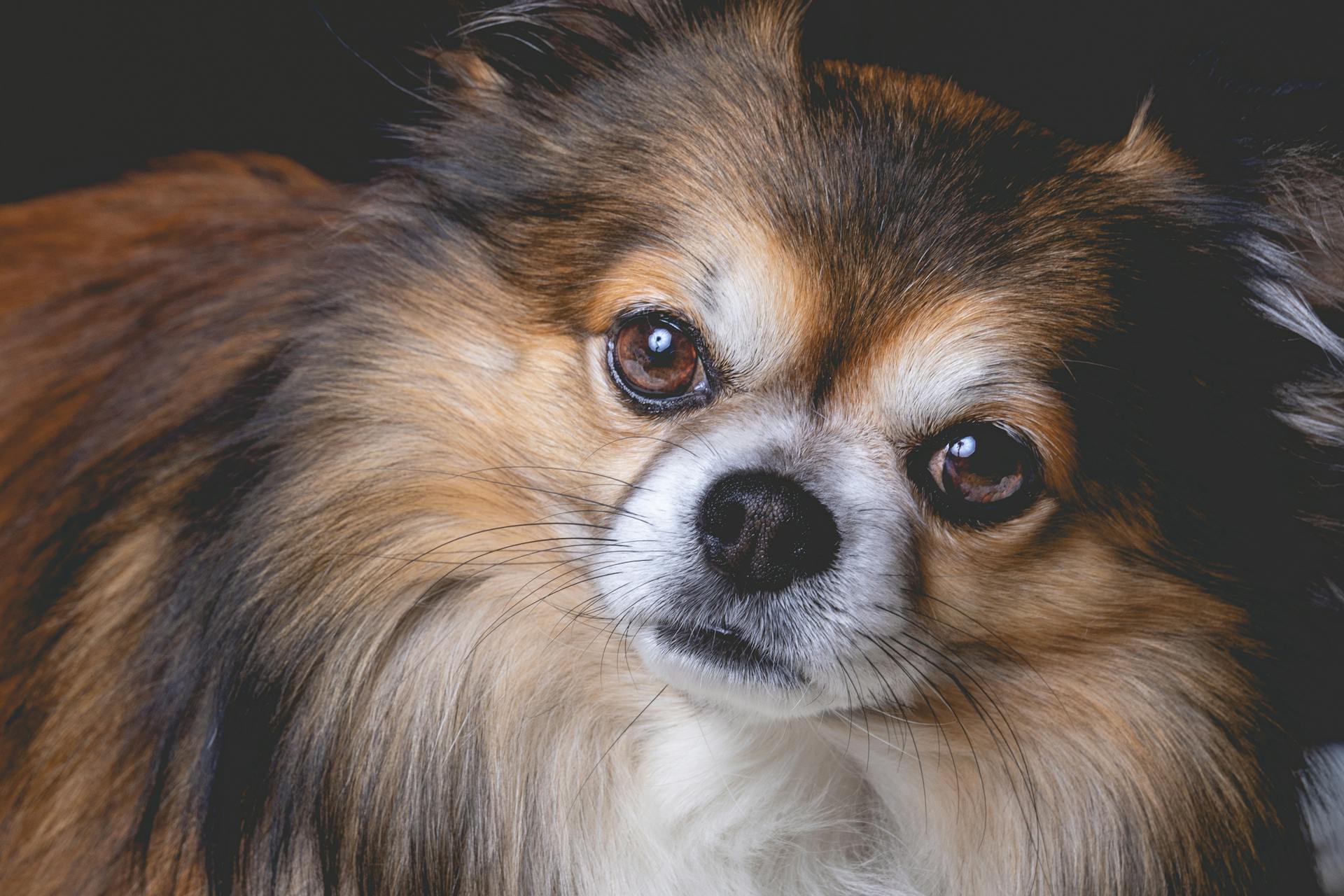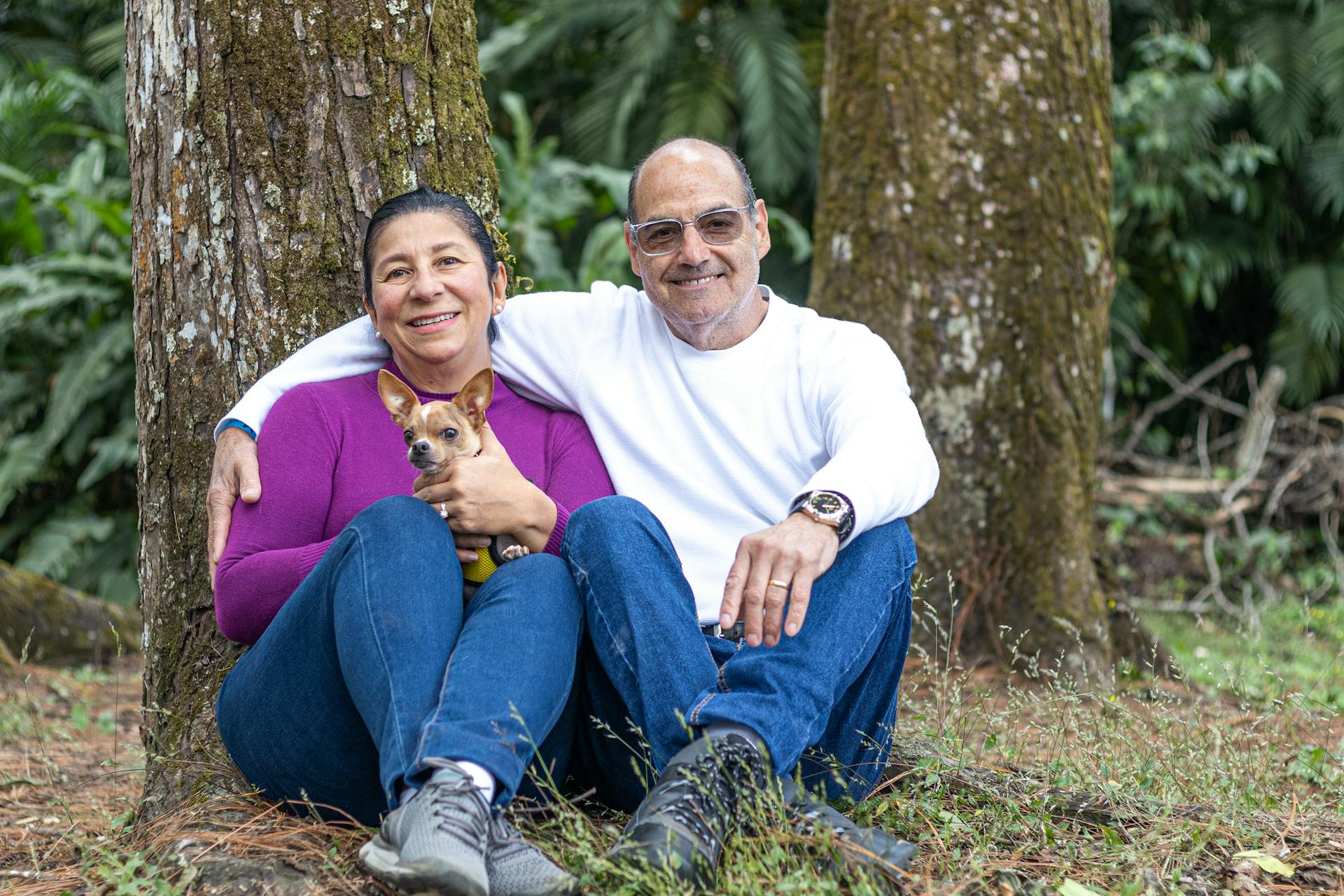
Long-haired Chihuahuas are known for their beautiful, flowing coats, but did you know that their lifespan can vary significantly from one dog to another? On average, a Long-haired Chihuahua's lifespan is between 12 to 18 years.
Their lifespan can be influenced by various factors, including genetics, diet, and health conditions. Some Long-haired Chihuahuas may live longer than others if they receive proper care and attention.
A well-cared-for Long-haired Chihuahua can live up to 15 years, but with regular check-ups and preventative care, they can live even longer.
Here's an interesting read: Preventative Care Keeping Your Pet Healthy Year-Round
Chihuahua Health and Lifespan
Chihuahuas are generally healthy dogs, but like all breeds, they can be prone to certain health issues. The average Chihuahua lifespan is 14-17 years, making them one of the longest-living dog breeds.
Their long lifespan is likely due to their small size, which means their hearts don't have to work as hard to keep blood circulating around their bodies. However, this doesn't mean they're immune to health problems.
Some common health issues that can affect Chihuahuas include dental disease, reverse sneezing, obesity, syringomyelia, heart disease, and eye problems. These conditions can be caused by a variety of factors, including genetics, diet, and lifestyle.
Regular veterinary check-ups are essential to monitor your Chihuahua's health and catch any potential issues early on. By staying on top of their health, you can help your Chihuahua live a long and happy life.
Here are some key health concerns to be aware of:
- Dental disease: Chihuahuas are prone to overcrowding and dental issues due to their small size.
- Reverse sneezing: This condition can be caused by the soft palate brushing against the back of the throat.
- Obesity: Chihuahuas can be prone to obesity, which can lead to other health problems.
- Syringomyelia: This condition affects the flow of cerebrospinal fluid and can be caused by a defect in the skull.
- Heart disease: Chihuahuas are prone to heart valve issues and patent ductus arteriosus.
- Eye problems: Chihuahuas can be prone to eye issues due to their large eyes and small eye sockets.
By being aware of these potential health issues, you can take steps to prevent or manage them and help your Chihuahua live a long and healthy life.
Breed Overview and Facts
Black, black & tan, blue & tan, chocolate, chocolate & tan, cream, fawn, fawn & white, and red are the various colors of the Chihuahua breed. They can be short-haired or long-haired, with the smooth coat being the more commonly kept of the two.
Check this out: Chocolate Labrador Problems
Chihuahuas are suitable for families with older children, apartments, and people who want a constant companion. They thrive in a variety of living situations.
Protective, playful, loving, and yappy are the temperament traits of Chihuahuas. These characteristics make them loyal companions.
Chihuahuas can weigh from two to eight pounds and stand from five to nine inches tall. This small size is one of the reasons they're often referred to as "handbag dogs."
They typically live longer than average lives, with a lifespan of up to 18 years. This means making a 20-year commitment to caring for a Chihuahua is essential.
Chihuahuas require regular training and care, just like larger dogs. They need attention, socialization, and exercise to stay happy and balanced.
Chihuahua mixes can also be teeny tiny, but can get up to about 25 pounds depending on the other varieties in their DNA. This mix of breeds can result in a more easygoing and healthier pet.
Chihuahua Care and Grooming
Long-haired Chihuahuas require regular brushing to prevent tangled hair, matting, and excessive shedding.
Brush your long-haired Chihuahua at least twice a week, using a wire brush or a comb, being gentle around their head to prevent injury to the Molera.
Brushing your Chihuahua's teeth should be a regular part of their grooming routine, as their soft teeth make them prone to bacterial infections and decay.
Occasional nail trimming may be required, especially if your Chihuahua spends most of its time indoors.
Baths are not needed frequently, but when you do bathe your Chihuahua, be careful to prevent water from entering their ears, as their large ears can be prone to infections and infestations.
Explore further: How to Prevent Diabetes in Dogs
Feeding and Exercising
Feeding your Long Haired Chihuahua requires consistency, as they can be prone to sensitive stomachs and obesity.
A healthy, adult Chihuahua needs only between 1/4 cup and 1/2 cup of dog food per day, which is easy to overfeed due to their eager eating habits.
Choose a kibble formulated for smaller dog breeds and a dry food that provides a lot of nutrients per serving.
A high-protein and high-fiber diet with low carbohydrates is ideal to prevent or treat low blood sugar.
Divide your Chihuahua's daily food into a few small meals to prevent Hypoglycemia and make them feel less deprived.
A 20-minute walk may be sufficient for most Chihuahuas, but 30 to 40 minutes of total exercise a day is not too much, as long as you allow them to rest between walks or play sessions.
In cooler weather, your Long Haired Chihuahua should wear a sweater or coat on walks.
You might like: How to Prevent Twisted Stomach in Dogs
Chihuahua Grooming Guide
The Long Haired Chihuahua sheds a lot, and regular brushing is a must to prevent tangled hair and matting.
You'll need to brush your Long Haired Chihuahua at least twice a week to keep their coat under control.
A wire brush or a comb is the most effective tool for removing excess hair, but be gentle around their head to prevent injury to the Molera.
Brushing your Chihuahua's teeth should be a regular part of their grooming routine, as their soft teeth make easy breeding ground for bacteria.
Inadequate dental hygiene can lead to infections and tooth loss, so don't neglect this important task.
Chihuahua puppies may fail to lose all of their milk teeth after their adult teeth come in, so keep an eye out for this and consult your vet if necessary.
Baths are not needed frequently, but when you do bathe your Chihuahua, be careful to prevent water from entering their ears to avoid infections.
Occasional nail trimming may be required, especially if your Chihuahua spends most of its time indoors.
4 Tips to Extend Your Chihuahua's Lifespan
Chihuahuas can live up to 18 years, so it's essential to think of adopting one as a 20-year commitment. Chihuahuas typically don't require a lot of grooming, but they do need regular care and training.
Chihuahua mixes can be a bit heartier, typically weighing between 10-12 pounds, and tend to have fewer health issues. These pets are still little, but easier to handle and care for.
Readers also liked: American Bully Care
To extend your Chihuahua's lifespan, it's crucial to provide them with a healthy diet and regular exercise. Chihuahuas are prone to obesity, so monitoring their food intake is vital.
Chihuahuas are known to live longer than average lives, but they do need regular veterinary check-ups to prevent health issues. By being proactive, you can help your Chihuahua live a long and happy life.
Average Lifespan and Health Issues
The average lifespan of a long-haired Chihuahua is between 14 and 18 years. This is impressive, considering that some Chihuahuas have been known to live up to 23 years old.
Their longevity is due in part to their small size, which means their hearts don't have to work as hard to keep blood circulating around their little bodies. However, like all dogs, Chihuahuas are predisposed to certain health issues.
Chihuahuas are prone to dental disease, which can be caused by overcrowding or a lack of proper dental care. Regular brushing of their teeth can help prevent this issue.
Worth a look: Dental Health Diets for Dogs
Reverse sneezing is another common problem in Chihuahuas, which can be triggered by the soft palate brushing against the back of the throat. Most cases are not severe, but in some cases, surgery may be needed to trim the soft palate.
Obesity is also a concern in Chihuahuas, as they can easily overeat due to their cute faces. Excess weight can put extra strain on other health conditions, such as syringomyelia and heart disease.
Here are some common health issues that can affect a long-haired Chihuahua's lifespan:
- Syringomyelia: a condition that affects the flow and drainage of cerebrospinal fluid between the brain and spine
- Heart disease: a relatively common condition in Chihuahuas that can progress to congestive heart failure
- Eye problems: Chihuahuas are prone to watery eyes and dry, irritated eyes due to their eye sockets being too small
- Hypoglycemia: a condition caused by low blood sugar, which can be more common in puppies but can also persist or develop in adulthood
It's essential to prioritize regular vet visits to increase your Chihuahua's chances of a healthy, longer life.
Frequently Asked Questions
What is the leading cause of death in Chihuahuas?
Heart failure is the leading cause of death in Chihuahuas, often resulting from valve deterioration that disrupts blood flow. Learn more about Chihuahua heart health and how to identify potential issues.
Is 14 old for a Chihuahua?
For a Chihuahua, 14 is actually considered middle-aged, as they can live up to 16 years on average. At 14, your Chihuahua still has many happy years ahead.
How long do Chihuahuas live indoors?
Chihuahuas typically live indoors for 14-16 years, making them one of the longest-living dog breeds. With proper care, they can enjoy a long and healthy life.
Sources
- https://www.petmd.com/dog/breeds/chihuahua
- https://www.dogster.com/dog-breeds/chihuahua
- https://www.thefarmersdog.com/digest/chihuahua-care-guide-food-exercise-personality/
- https://animalcorner.org/dog-breeds/long-haired-chihuahua/
- https://rockykanaka.com/how-long-do-chihuahuas-live-everything-you-should-know-about-the-chihuahuas-lifespan/
Featured Images: pexels.com


